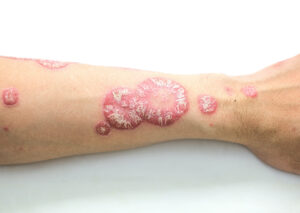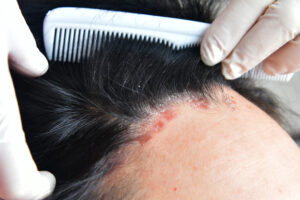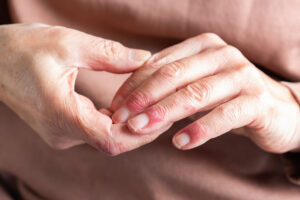Triggers of Psoriasis Flare-ups
Hello Everyone! I hope that you are well. For this post, I am covering psoriasis since many people wonder why they have psoriasis all of a sudden or want to know what psoriasis triggers are and why medication only works temporarily.
Treating psoriasis at its source is essential since it can also run alongside other conditions. A small patch of psoriasis can indicate you should take action before it leads to other conditions.
Depression, obesity, arthritis, and many other conditions can run alongside psoriasis. I will explain.
What Is Psoriasis?
What Triggers Psoriasis?
Diseases Associated With Psoriasis
Should I Ignore a Small Psoriasis Patch?
What Medication Works for Psoriasis?
How to Treat Psoriasis

What Is Psoriasis?
If you wonder what psoriasis is and why you have psoriasis, it is good to understand what it is. Psoriasis is a chronic inflammatory autoimmune condition affecting 2-3% of the world’s population. Psoriasis is not contagious, but none of us are immune, regardless of age.
In the immune system, T-cells hunt invading foreign pathogens and provide antibody responses to keep the body healthy. With psoriasis, the T-cells see parts of the skin as foreign and start to attack it, leading to an overproduction of new T-cells, white blood cells, and skin cells.
An overactive immune system creates inflammation in the body!

This pile-up of skin cells appears on the skin in itchy, swollen, red, purple, salmon-colored (depending on how light or dark your skin is), thickened patches with silvery scales. It can be mild, moderate, and severe, affecting people psychologically and physically.
There are many types of psoriasis, including:
• Plaque Psoriasis is the most common and can be on all body parts.
• Guttate Psoriasis – Small bumps that cover the body, usually in children recovering from an infection.
• Inverse Psoriasis – Appears in folds, like the buttocks, armpits, layers of fat on the stomach, underneath the breasts, and in the groin.
• Nail Psoriasis – Nail pits, nail separation, and soreness around the nail.
There are also rare and life-threatening psoriasis conditions like Pustular (pus-filled bumps) and Erythrodermic (looks like extensive burns accompanied by fever, chills, and dehydration) that require immediate medical attention.

What Triggers Psoriasis?
• Chronic inflammation conditions
• Being overweight (obesity is a chronic inflammatory condition. Psoriasis can start in skin folds, so obesity puts you more at risk)
• Leaky Gut Syndrome.
• Bacteria – Candida albicans, strep B, Hepatitis C, Herpes, etc.
• Stress – prolonged stress makes the immune system overactive and increases inflammation in the body
• Medication – interferon, lithium, beta-blockers, antimalarials, antifungals, and steroid cream, for instance
• Poor diet – insufficient nutrition, extreme dieting, and an abundance of ultra-processed foods. Good gut health is imperative for good health.
• Not enough good quality sleep – increases inflammation and jeopardizes immunity
• Unhealthy lifestyle – smoking, drinking, recreational drugs, and not enough exercise
• Hormones – hormonal changes increase inflammation
• Injuries to the skin, like friction, scalding, radiation, and ultraviolet rays
• Genes
• Weather temperature. It has been noted that the cold weather can be a psoriasis trigger, but this could be because of a lack of sunshine. (Some things may be beyond our control, but if you follow the personalized advice for treating psoriasis, you will reduce and, most likely, put psoriasis into remission. See below).

You may be interested in reading What Kills Candida Fast, Naturally?
Diseases Associated With Psoriasis
One in three people develop what is known as psoriatic arthritis due to sustained inflammation in the body. Still, any chronic inflammation running consistently in the body heightens other health risks.
Sustained inflammation affects every part of you!
You are more susceptible to inflammatory bowel disease, digestive issues, obesity, hypertension, insulin resistance, diabetes, dyslipidemia, cardiovascular disease, cancer, depression, fatty liver disease, kidney disease, chronic fatigue, alopecia, thyroid, and respiratory diseases when you have inflammation running consistently.

You may be interested in reading Fatty Liver Diet: How to Look After Your Liver and How To Ease Chronic Fatigue Syndrome/ME.
Should I Ignore a Small Psoriasis Patch?
Even if psoriasis only affects less than 3% of your skin, you shouldn’t ignore it. It would be hard to since a small patch can cause itchiness and emotional distress. Even a tiny patch on the elbow or your hand is a sign that chronic inflammation is running in your body and needs to be lowered.
You may be interested in reading Signs of Inflammation That May Surprise You and How to Silence Hidden Inflammation.
What Medication Works for Psoriasis?
I always advise talking with your doctor about any health issue you may have. I have consulted with numerous doctors and specialists throughout my health journey.
Medication can save lives, and certainly seek immediate medical care for psoriasis that appears as pus-filled bumps or a large burn that accompanies chills, fever, and dehydration in your body.

In the long run, medication doesn’t treat the source, stops working after a while, and causes gut dysbiosis, leading to more chronic inflammation. This is a perpetual cycle and does not stop the condition. Medication and topical creams can make the condition worse.
Many drugs come with other side effects, too. Immunosuppressant medicines that are often given for psoriasis actually weaken the immune system, thereby heightening the risk of infections and diseases.
Did you see these posts?: Side Effects of Antibiotics: Another Cause of IBD and NSAIDS, Gut Health & Inflammation.
How to Treat Psoriasis
Chronic inflammation means a dysregulated immune system, which is what happens with psoriasis.
If you reduce inflammation, you can put psoriasis into remission.
Even if it is genetic, you can change genetic expression!

Start here as soon as you can to reduce chronic inflammation and psoriasis. You will reset your body and lose weight if obesity is an issue, reduce pain if you have joint pain, sleep better, and so on. Personalized advice for psoriasis is here for premium members.
Try these delicious psoriasis-friendly recipes: Persian Chicken Stew with Dried Plums & Cherry & Almond Clafoutis.
I advise you to take a picture of your psoriasis before you start and see the difference in 6 weeks! (It took just 14 days for our member, Michelle, to see a significant difference. Check the testimonials!).
Please share your success with me by sending me a DM on Instagram.
Have an amazing day, Everyone!


